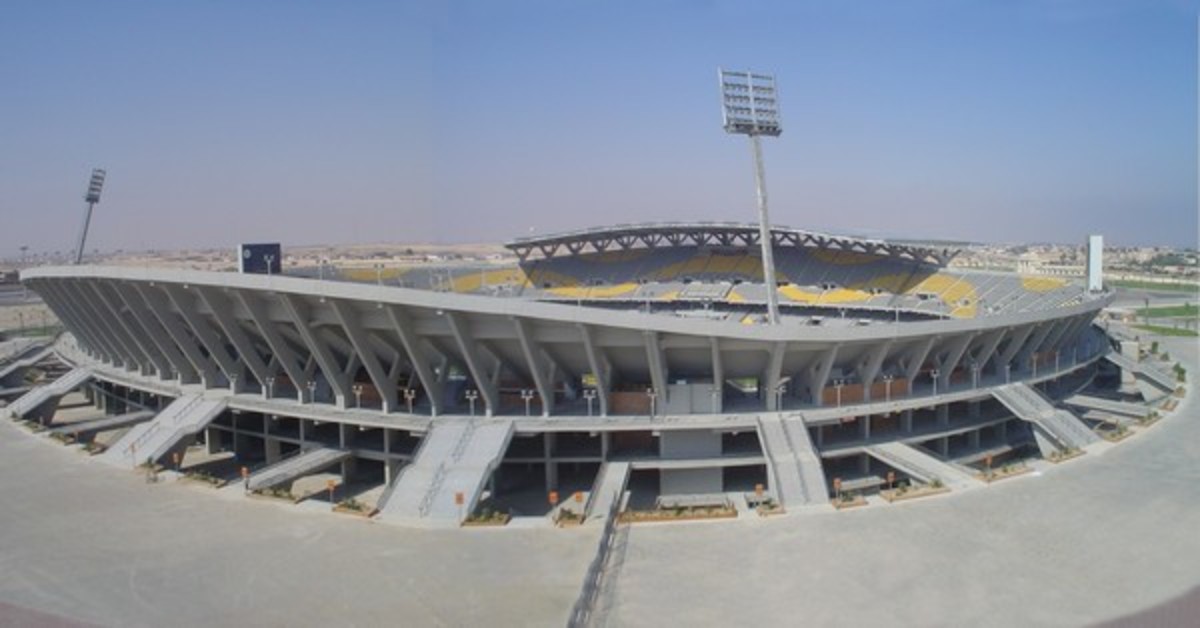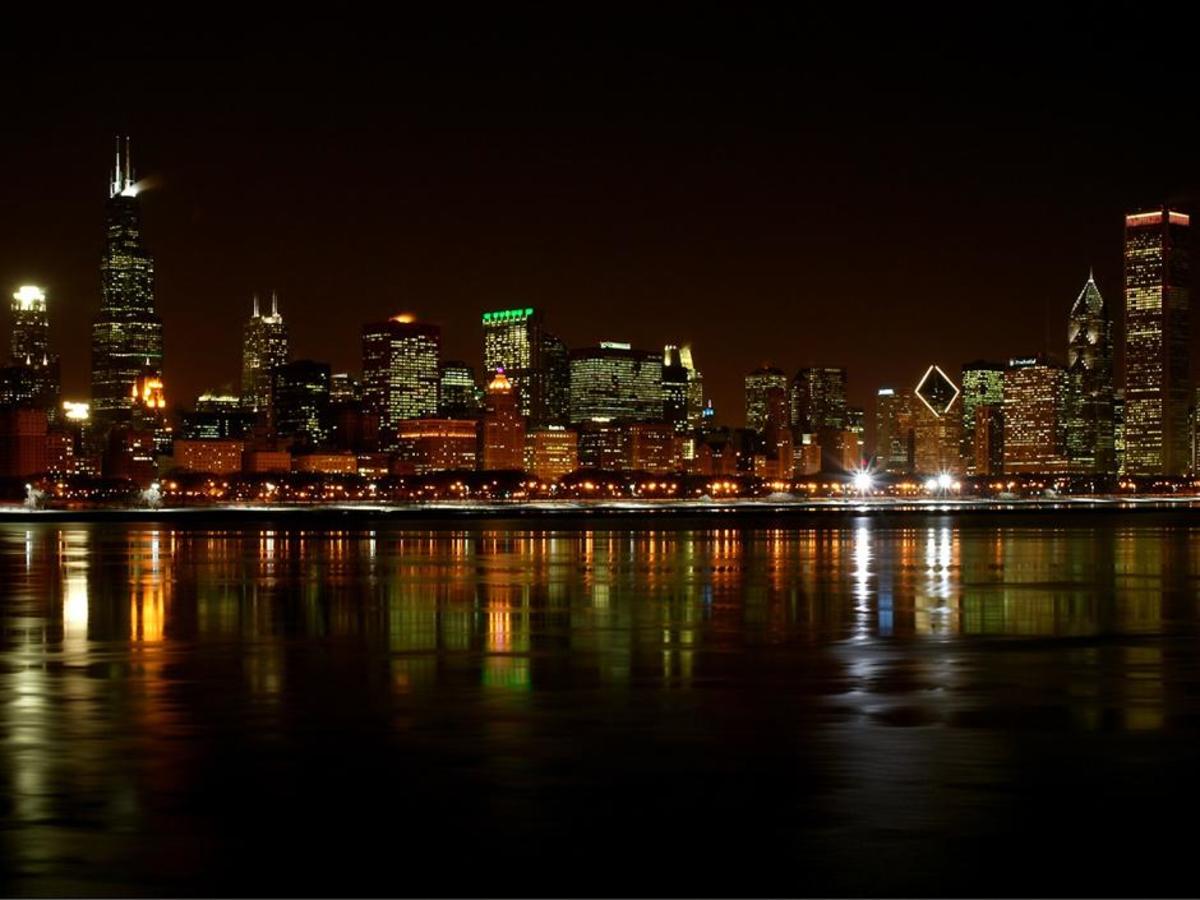Green Initiatives for Commonwealth Games 2010
XIXth Commonwealth Games 2010, Delhi
Delhi, the capital city of India is getting beautified like a bride for the upcoming mega-sporting event, Commonwealth Games 2010 in October. The 12 day event from 3rd to 14th October 2010 will involve 71 participants (Commonwealth Games Associations) and will host 17 sports across 23 sporting venues in and around the city. This is the XIXth Commonwealth Games, where the best of athletes (about 8000) will come from 71 Commonwealth Nations to showcase their mettle.
India is having the honour of hosting this sporting event of international standards 28 years after Asiad Games in 1982 and this is the second time Commonwealth Games will be hosted in Asia after 1998, when it was held in Kuala Lumpur, Malaysia. Having such a privilege is a pride for one's country and the Organizing Committee is leaving no stone unturned to make it a great success.
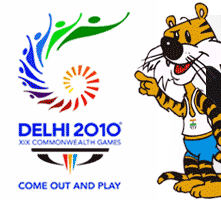
CWG 2010 will go green!
What I feel proud about the most is the initiative of the Organizing Committee of Commonwealth Games, Delhi to strive towards the staging of the first ever "Green Commonwealth Games". Beijing Olympics, 2008 and the ongoing FIFA World Cup 2010 in South Africa have undertaken green principles and green technologies as a joint venture with United Nations Environment Programme (UNEP). But this will be the first time when Commonwealth Games will go green.
Hence in this hub I will highlight the proposals made by the Organizing Committee and the initiatives that have already been taken by the government and the Department of Environment in the capital city in the run-up to the CWG 2010, Delhi.
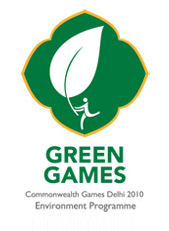
Green Proposal of Commonwealth Games 2010
The environment will play a pivotal role in Commonwealth Games 2010 as the CWG organizers in Delhi, jointly working with the United Nations Environment Programme (UNEP), have proposed to implement a series of green measures to make this one of the greatest green sporting events.
In October 2007, the organizers of the Commonwealth Games 2010, Delhi had tied up with the UNEP and signed a Memorandum of Understanding (MoU) in order to integrate major environmental considerations into the planning and staging of the first ever "Green Commonwealth Games".
The green measures which were proposed under MoU are called Ecological Codes and they would cover the areas of:
- Conservation of biodiversity
- Extensive afforestation
- Energy efficiency
- Effective waste management
- Reduced air and noise pollution
- Sustainable transportation
- Conservation of water
- Waste water treatment
- Use of renewable energy
Green vision
Green Vision: "To strive towards reducing carbon footprint and become the sustainable development benchmark for multi-disciplinary games in the future"
United Nations of Environment Programme had been the environment advisor since October 2007 (after signing the MoU) who laid the Ecological Codes and assisted the Organizing Committee of Commonwealth Games, Delhi in strategizing the efficient implementation of the eco-friendly practices.
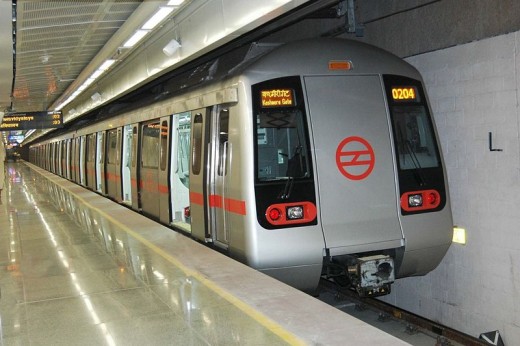
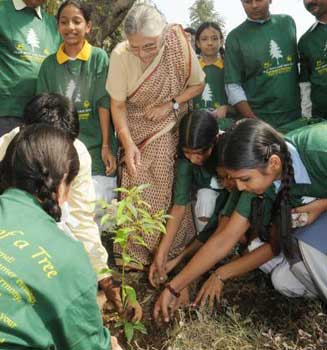
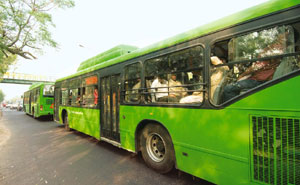
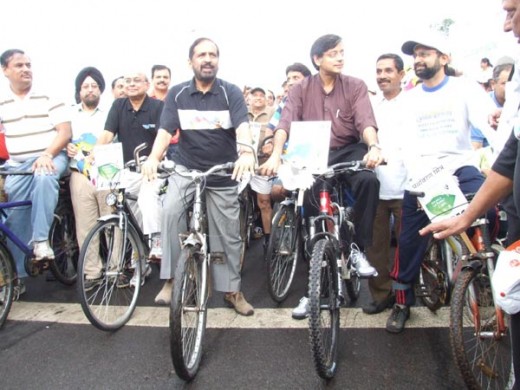
Green Initiatives for a carbon-neutral sporting event
Some of the green initiatives taken by the Organizing Committee of CWG 2010, Delhi are:
- On 5th June 2009, the World Environment Day, 71 Jasmine saplings were planted in the "Commonwealth Garden of 71" (created at Hotel Ashok, the Games family Hotel) signifying the 71 participating Commonwealth Games Associations (CGA).
- A green games portal or microsite, highlighting the vision, activities and environmental awareness programmes was launched on the same day within the Commonwealth Games 2010 website.
- A tree plantation drive was undertaken in October 2009 in order to lower carbon footprints and compensate the adverse effect of ongoing construction work. The first "city forest" was developed by planting 3000 saplings in Arya Nagar, Delhi by student volunteers of eco-clubs, schools and colleges, officials of Delhi government, Department of Environment and Organizing Committee. Following this, many more of such "city forests" were developed to enhance the green cover of the city
- One of the coal based power plants was closed down for cleaner air
- On 5th June 2010, the Organizing Committee CWG, coupled with the Department of Environment had organized a sustainable transport rally of bicycles, electric cars and electric bikes. More than 200 people participated in the rally.
- By the end of July 2010, air quality monitoring system will start providing real time pollution data at 11 key locations in the city and will continue till the Commonwealth Games in October
- Increased number of metro routes have been built to connect various parts of the city and the national capital region (immediate outskirts) to public transportation system
- Delhi had already introduced a fleet of green buses running in clean fuel (Compressed Natural Gas) and the number of those buses are increased to ensure sustainable transportation
- All the 2000 vehicles for transporting officials and athletes will run on Compressed Natural Gas
- Recycled paper stationery will be used during the Games
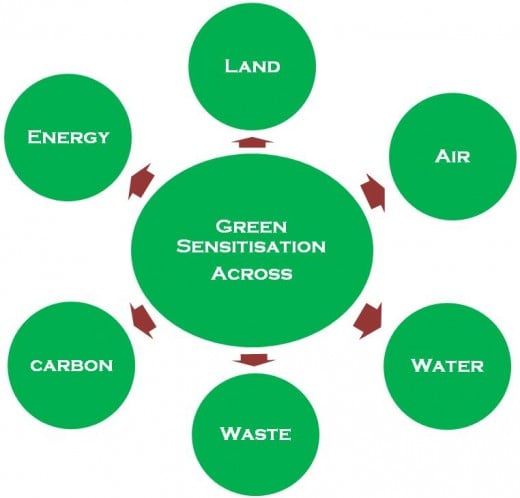
Strategies adopted to ensure green sporting venues
Several green initiatives for verticals such as land, air, water, waste and energy have been taken during the construction and renovation of the competition and non-competition venues with a vision to reduce carbon emissions.
- Land: 30% green cover was ensured in all the sporting venues and diodiversity landscaping was strategized
- Air: Paints without volatile organic compounds were used and strategic bio-diverse afforestation included planting of dust-absorbing, carbon-sequestrating and pollutant gas-absorbing species
- Water: Low flow fixtures were used to reduce water consumption, water efficient chillers and sensor based fixtures and fittings were used, rainwater harvesting system was put to operation, drip irrigation was used for landscaping
- Waste: Waste water was treated for flushing and horticulture, building bricks were made of fly ash, waste water treatment was carried out through centralized units, recycled PVC (polyvinyl chloride) was used and other construction debris were reused.
- Energy: Solar energy is used for external lighting and water heaters, energy efficient lighting systems such as CFLs, LEDs and TL5 are used, buildings are designed in order to have daytime natural lighting, integrated building management systems are strategized for stadiums and double glazed windows are used to save energy.
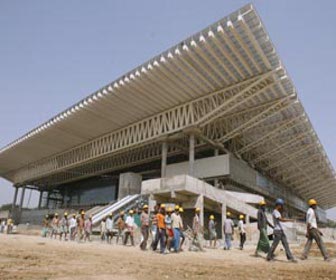
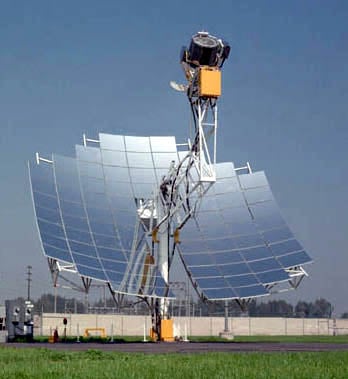
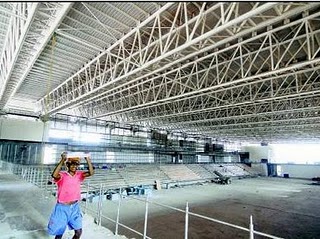
Thyagaraj Stadium: The Green Model
Thyagaraj Stadium, India's first eco-friendly stadium has been reconstructed and was inaugurated in April 2010 which will be the venue for the Netball competition in the upcoming Commonwealth Games. Covering an area of 16,000 square metres, it is built on the principles of "green building technologies".
- The bricks used for the construction are made of environmentally friendly fly-ash
- Water conservation is ensured by installment of affluent treatment plant to recycle water within the stadium and rain water harvesting system.
- Piped natural gas (PNG) (clean fuel) run turbines (imported from USA and assembled in Switzerland) will be used for 3.5 MegaWatt power generation of the entire stadium
- The exhaust heat of the turbine will be used to run the central AC of the entire stadium with the help of Vapour Absorption Machine (VAM)
- Solar energy is being used for power inside the building and also will be stored and harnessed for other purposes; the broad roof (107m x 185 m)of the stadium fitted with solar panels is generating about 1 MegaWatt power.
- Specialised double-glazed glass windows are used for high light transmission but low heat transmission to cut down costs on lighting and reduce AC load
- Specialised brick walls are made which have cavities acting as acoustic and thermal barriers
All these above green measures put together will be successful in the endeavour of leaving minimal carbon footprint.
WELCOME to Commonwealth Games 2010 in Delhi!
Have a Green Experience!
For all info regarding CWG 2010, Delhi
Read my other hubs on Commonwealth Games 2010
- The Queen's Baton Relay in Commonwealth Games 2010
The Queen's Baton Relay is one of the greatest traditions in the Commonwealth Games since the time of its inception in 1958. It bears the same honour in the Commonwealth Games as the torch in the Olympic... - Real Status of the Mascot of Commonwealth Games 2010 Delhi
The dictionary meaning of the word "mascot" is an animal or a toy or a person dressed like an animal, which represents a team or organization. Mascots were thought to bring "good luck" to the team or...






